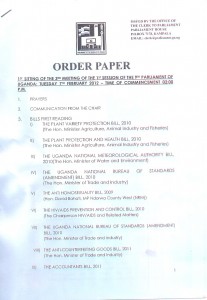This just in from the Uganda Media Centre:
ANTI-HOMOSEXUAL BILL
February 08, 2012
RESPONSE TO INTERNATIONAL CRITICISM
OF DEBATE ON ANTI-HOMOSEXUAL BILL
Uganda has today been the subject of mass international criticism as a result of the debate on the Anti-Homosexual Bill at parliament. What many of these critics fail to convey is the bill itself was introduced by a back bencher. It does not form part of the government’s legislative programme and it does not enjoy the support of the Prime Minister or the Cabinet. However as Uganda is a constitutional democracy, it is appropriate that if a private members bill is presented to parliament it be debated.
Cultural attitudes in Africa are very different to elsewhere in world, 2/3 of African countries outlaw homosexual activity and 80% of east African countries criminalize it. Whilst on a global level more than 80 countries outlaw homosexual acts. Contrary to reports, the bill before parliament even if it were to pass, would not sanction the death penalty for homosexual behavior in Uganda.
Many international governments and politicians, who have criticized Uganda for debating this private members bill, remain mute in the face of far graver and far more draconian legislation relating to homosexuality in other countries. One might ask for example, if Uganda enjoyed as close a relationship with the US and European countries as Saudi Arabia (which sentences homosexuals to corporate and capital punishment) would we have attracted the same opprobrium as a result of allowing this parliamentary debate.
Unlike many other countries, no one in Uganda has ever been charged with the criminal offence of homosexuality. Moreover the main provisions of this bill were designed to stem the issue of defilement and rape which in the minds of Ugandan’s is a more pressing and urgent matter that needs to be addressed.
As a parliamentary democracy this process of debate will continue. Whilst the government of Uganda does not support this bill, it is required under our constitution to facilitate this debate. The facilitation of this debate should not be confused for the governments support for this bill.
Fred Opolot
Executive Director
What is confusing here, and perhaps intentionally so, is the statement above that the bill would not lead to the death penalty. The plain language of the bill does require it for HIV positive people and serial offenders. And, let’s remember, life in a Ugandan prison is also called for in this bill for any homosexual intimacy.
The designation of Bahati as a “back bencher” may be intended to make it seem that Bahati is an insignificant figure in Uganda. However, this is not the case. Bahati is currently the deputy chief whip for the ruling National Resistance Movement party. The NRM is the party of President Yowari Museveni and is the dominant political party in Uganda. Bahati has a position of power and influence within the party and as such is not a minor player.
Related:
- Ugandan MPs Cheer Introduction of Original Anti-gay Bill
- Uganda’s Anti-Homosexuality Bill to be Tabled in Parliament Today – UPDATED

